Leader of the Liberal Democrats
The Liberal Democrats are a political party in the United Kingdom. Party members elect the Leader of the Liberal Democrats. The Leader of the Liberal Democrats is the head and highest ranking member of the party. Liberal Democrat Members of Parliament also elect a Deputy Leader of the Parliamentary Party in the House of Commons, often colloquially referred to as the Deputy Leader. Under the federal constitution of the Liberal Democrats the leader is required to be a member of the House of Commons.
| Leader of the Liberal Democrats | |
|---|---|
| Member of | |
| Appointer | Liberal Democrats membership |
| Inaugural holder | David Steel and Bob Maclennan |
| Formation | 3 March 1988 |
| Website | Official website |
Before the election of the first federal leader of the party (the Liberal Democrats having a federal structure in their internal party organisation), the leaders of the two parties which merged to form the Liberal Democrats, the Liberal Party and the Social Democratic Party (SDP), served as joint interim leaders.
In the event that the leader dies, resigns or loses their seat in Parliament, the deputy leader (if there is one) serves as interim leader until a leadership election takes place. This has occurred three times, with Menzies Campbell serving as interim leader following the resignation of Charles Kennedy (Campbell was elected leader in the ensuing election) and Vince Cable serving as interim leader following Campbell's resignation. Jo Swinson lost her seat in the general election held on 12 December 2019, thus ceasing to be leader; deputy leader Ed Davey and Party President Sal Brinton became acting co-leaders.[1] Brinton was replaced by Mark Pack following his assuming the office of Party President on 1 January 2020.
Overall Leaders
| Leader (Birth–Death) |
Portrait | Constituency | Took office | Left office | Prime Minister (term) | |
|---|---|---|---|---|---|---|
| David Steel[lower-alpha 1] (1938–) |
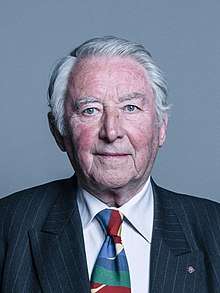 |
Tweeddale, Ettrick and Lauderdale | 3 March 1988 | 16 July 1988 | Thatcher 1979–1990 | |
| Bob Maclennan[lower-alpha 2] (1936–2020) |
 |
Caithness and Sutherland | ||||
| Paddy Ashdown (1941–2018) |
_(cropped).jpg) |
Yeovil | 16 July 1988 (Elected) |
9 August 1999 | ||
| Major 1990–1997 | ||||||
| Blair 1997–2007 | ||||||
| Charles Kennedy (1959–2015) |
.jpg) |
Ross, Skye and Inverness West (1999–2005) Ross, Skye and Lochaber (2005–2006) |
9 August 1999 (Elected) |
7 January 2006 | ||
| Sir Menzies Campbell[lower-alpha 3] (1941–) |
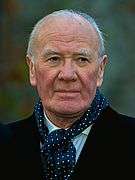 |
North East Fife | 2 March 2006 (Elected) |
15 October 2007 | ||
| Brown 2007–2010 | ||||||
| Sir Vince Cable[lower-alpha 4] (1943–) |
 |
Twickenham | 15 October 2007 | 18 December 2007 | ||
| Sir Nick Clegg[lower-alpha 5] (1967–) |
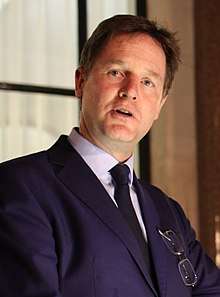 |
Sheffield Hallam | 18 December 2007 (Elected) |
16 July 2015 | ||
| Cameron 2010–2016 | ||||||
| Tim Farron (1970–) |
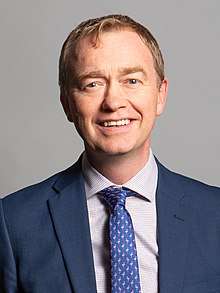 |
Westmorland and Lonsdale | 16 July 2015 (Elected) |
20 July 2017 | ||
| May 2016–2019 | ||||||
| Sir Vince Cable (1943–) |
 |
Twickenham | 20 July 2017 (Unopposed) |
22 July 2019 | ||
| Jo Swinson (1980–) |
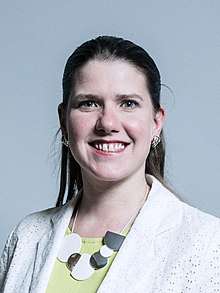 |
East Dunbartonshire | 22 July 2019 (Elected) |
13 December 2019 | ||
| Johnson 2019–present | ||||||
| The Baroness Brinton[lower-alpha 6] (1955–) |
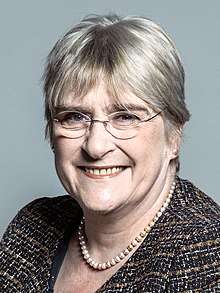 |
N/A | 13 December 2019 | 31 December 2019 | ||
| Sir Ed Davey[lower-alpha 6] (1965–) |
 |
Kingston and Surbiton | Incumbent | |||
| Mark Pack[lower-alpha 6] | _speaking_at_the_launch_of_PX_report_'Northern_Lights'_(cropped).jpg) |
N/A | 1 January 2020 | |||
Living former party leaders
There are six living former party leaders. From oldest to youngest:
| Leader | Term of office | Date of birth |
|---|---|---|
| David Steel | 1988 | 31 March 1938 |
| Menzies Campbell | 2006–2007 | 22 May 1941 |
| Vince Cable | 2007 | 9 May 1943 |
| 2017–2019 | ||
| Nick Clegg | 2007–2015 | 7 January 1967 |
| Tim Farron | 2015–2017 | 27 May 1970 |
| Jo Swinson | 2019 | 5 February 1980 |
Leaders in the House of Lords
See also
- List of United Kingdom Whig and allied party leaders (1801–59)
- Leader of the Conservative Party (UK)
- Leader of the Labour Party (UK)
- Leader of the Liberal Party (UK)
Notes
- Joint acting leader, as the last leader of the Liberal Party before the merger.
- Joint acting leader, as the last leader of the Social Democratic Party before the merger.
- Acting leader between the resignation of Charles Kennedy on 7 January 2006 and his own election as leader on 2 March 2006.
- Acting leader between the resignation of Menzies Campbell on 15 October 2007 and the election of a new leader on 18 December 2007.
- Deputy Prime Minister as part of the Coalition with the Conservative Party; resigned on 8 May 2015 following the 2015 general election, but formally retained leadership until a successor was chosen.[2][3]
- Joint acting leader following Jo Swinson's resignation (after her failure to be re-elected to her parliamentary constituency).
References
- "Who will be the next Lib Dem leader after Jo Swinson loses her seat?". ITV News.
- "Nick Clegg resigns as Lib Dem leader". The Guardian. 8 May 2015. Retrieved 16 May 2015.
- "Every major British political party – except the Conservatives – currently led by a woman". The Independent. 9 May 2015. Retrieved 16 May 2015.
Sources
- Federal Constitution of the Liberal Democrats